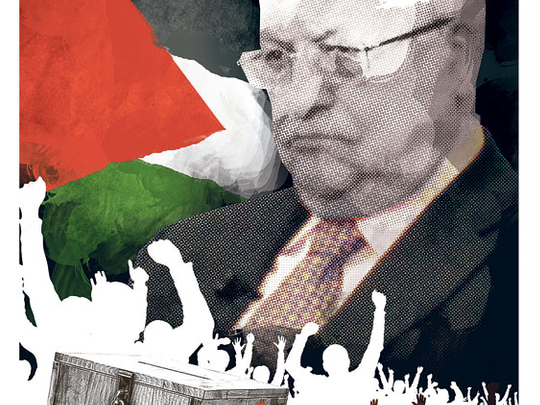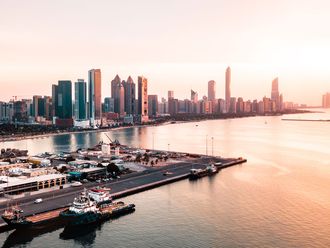
On February 17, thousands of Palestinians in the West Bank took to the streets of Ramallah, chanting for unity. This long-overdue act of mass public mobilisation was largely inspired by the calls for change emanating across Arab countries, Egypt in particular.
Like other Arab leaders, Palestinian National Authority (PNA) President Mahmoud Abbas tried to circumvent the risk of popular upheaval by declaring immediate changes. However, considering the fact that Abbas' reforms included accepting the resignation of Salam Fayyad's government on February 14, and then instructing Fayyad, on the very same day, to set up another government, shows that these changes are merely procedural. They will not be followed by any far-reaching overhaul of the way things operate in Ramallah.
The PNA's move was accompanied by two, equally baffling, announcements: the resignation of chief Palestinian negotiator Saeb Erekat on February 12, and the scheduling of parliamentary and presidential elections in the occupied territories in September.
Erekat — largely discredited for his role in negotiating away fundamental Palestinian rights, such as sovereignty in occupied east Jerusalem, and the right of return for millions of refugees — was a suitable scapegoat for the PNA. However, it was hardly his fault alone. The Palestine Papers have revealed a long-running tendency by the PNA to concede well beyond the acceptable parameters of most Palestinians, including Abbas's own faction, Fatah.
Although Erekat was chosen to carry the burden alone, he opted for a grand exit. The Washington Post reported on February 16 that Erekat had intended his resignation to serve as an "example of accountability". The problem, we are told, is not what Erekat has said and done in the past ten years of negotiations. It is the fact that the Palestine Papers were leaked through his office. "I'm making myself pay the price for the mistake I committed, my negligence. These are the ethics and the standards. Palestinian officials need to start putting them in their minds," Erekat told the Post.
This will hardly satisfy Palestinians, whose frustration is turning into sheer anger over the ongoing political division, and the lack of a clear path in their struggle for freedom. The anger was on full display in Gaza, on January 26, when a large rally, intended to extend solidarity to the Egyptian people, turned into a day of fervent anti-Abbas and anti-PNA chanting.
In the West Bank, no such demonstrations were allowed. Every attempt at showing support for the Egyptians was quickly dismantled by hundreds of PNA police officers. However, there is no guarantee that the PNA security — funded and largely trained by US military personnel — will be able to contain public dissatisfaction for long.
This is the most likely reason for setting September as a date for elections. If held, they would be the first since 2006, when Hamas won. Abbas' party, Fatah, didn't accept the results, and, backed by the US, Israel, Egypt under Mubarak and others, managed to turn what could have been a positive democratic experience into an Israeli siege on Gaza. The siege followed a brief civil war, and was interrupted by an Israeli war (2008-09) which left thousands of Palestinians dead or wounded.
This has been the bloody legacy of the last democratic elections. Not many Palestinians in the Occupied Territories can genuinely believe that another election will be the answer to the current deadlock. Expectedly, Hamas has rejected the proposal.
Not only does it serve no clear purpose, but the call for elections came from an increasingly discredited government which has no true sovereignty under Israeli military occupation.
Thousands of Palestinians in Ramallah agree. "I am here in solidarity with the Palestinian people, and to see an end to the division. Because there is one nation, and one people," a protester Amira Sliman told Reuters. Another, Murad Jadallah said: "We are not looking for elections, we want Palestinian national unity."
Considering the pressing issues facing the Palestinian people, one would assume that a top priority would be forming a unified front to ward off the Israeli military occupation and the rapid colony-building in occupied east Jerusalem and the West Bank under the right-wing government of Prime Minister Benjamin Netanyahu. Another priority would be the lifting of the suffocating siege on the Gaza Strip, under which 1.5 million Palestinians subsist in sheer misery.
Instead, the PNA has proposed elections, which can only distract from the growing discontent, and accentuate the disunity that has marred inter-Palestinian relations for years.
Initially Abbas argued it was "unreasonable to hold the elections in the West Bank alone, it must be in Gaza as well." This statement alludes to a possible agreement with rival Hamas. Yasser Abed Rabbo had different plans. In a statement on February 16, the top PNA official said: "We can't be held hostage by Hamas and remain without elections."
All eyes are now directed towards September, instead of the unflattering reality here and now.
It remains to be seen whether discontented Palestinians will wait so long to take their calls for unity and freedom to the streets of Gaza and the West Bank.
- Ramzy Baroud is an internationally-syndicated columnist and editor of PalestineChronicle.com. His latest book is My Father Was a Freedom Fighter: Gaza's Untold Story.










